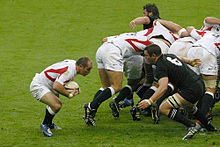If your flanker you should try to be the first to the ruck and securing the ball as often as you can- you can do the first by closely supporting a player and rucking over when they get tackled- if you see that your team has already won or loss the ruck and there's no point in you going in then you should either go into the back line and act as an extra player and you could pass it along or hit the oppositions defensive line or you could go behind the backs line and make sure your near the player which gets tackled so your the first to the ruck.
The best flankers know what they can get away with and play the ref, if you look at Richie McCaw hes always doing this, this just comes with experience and knowledge of the rules.
In the scrum:
The flanker in the scrum is at the side binding on to the second row and the prop.
With the arm binding to the second row don't have the bind close to you, you want your arm outstretched over his back, you then bind with the prop in front of you by grabbing a piece of his shorts/shirt on the outside of his leg.
Have you shoulder just under the props butt so your supporting him and pushing him up, you'll be in quite a low position and so you need to have your legs quite far back so your butt his lower than your head which means you will be pushing up.
During the scrum you want to have your head up and if you can looking at the ball waiting for the scrumhalf to put two hands on it, as soon as he does you can unbind and then you want to put pressure on him by trying to tackle him and hopefully make him give a bad pass and if possible tackle him.
If the scrumhalf passes the ball before you get him, which sadly he will most of the time, then if your open side (on the side of where most of there back line players are standing) your job is to make sure there flyhalf doesn't cut inside your flyhalf, because if he does your there to tackle him.
With the arm binding to the second row don't have the bind close to you, you want your arm outstretched over his back, you then bind with the prop in front of you by grabbing a piece of his shorts/shirt on the outside of his leg.
Have you shoulder just under the props butt so your supporting him and pushing him up, you'll be in quite a low position and so you need to have your legs quite far back so your butt his lower than your head which means you will be pushing up.
During the scrum you want to have your head up and if you can looking at the ball waiting for the scrumhalf to put two hands on it, as soon as he does you can unbind and then you want to put pressure on him by trying to tackle him and hopefully make him give a bad pass and if possible tackle him.
 |
| number 8 taking ball, flanker quickly coming of the scrum to tackle him. |
If your blindside flanker and they have a scrum close to your try line then you should always be ready for there number 8 to pick up the ball himself and run down your side and you need to make sure you tackle him
There is a dirty trick that flanker on your own scrum, if the opposite scrumhalf comes round the scrum on your side you can stick your leg out in his way to stop him coming round or at least slow him down which gives your scrumhalf a bit more time and it makes your scrumhalf's life a whole lot easier!
line outs:
In the line outs you may be getting lifted or be lifting, you can read my guide on that here.
If your not doing either of them then you'll be at the back of the line out, if your here then all you have to do is be ready if the ball is dropped and try to get it by diving on it or if there scrumhalf gets it put pressure on him by running and trying to tackling him.
Open Play:
Like i said before as a flanker you should try always be in the action whether that's rucking or running with the ball, being able to ruck well is an extremely important trait for any forward but especially important for the back row (number 8 and flankers), you can see my guide for rucking here.



Good advice and guidance for fundamentals of the positions, so sorry to be a snag about it. And it's all fine if you are TALKING about the issues, but if you're going to WRITE about rugby (or anything else), it is imperative that you use correct spelling, grammar, punctuation, etc. English is the language being used here, so it should be used correctly. Same if it's French, Italian, etc. Like scrum play, it should be tight, proper, and reflect a standard of excellence.
ReplyDeleteWrong: "If your flanker you should ..."
Right" "If you're a flanker you should ..." or "If you are a flanker you should ..."
Wrong: "...supporting a player and rucking over when they get tackled..."
Right: "...supporting a player and rucking over when he gets tackled..." or "...supporting players and rucking over when they get tackled..."
There are a lot more similar errors. If this is a learning site, it's best to use the language correctly. Perhaps you can get someone to edit the work.
Good advice and guidance for fundamentals of the positions, so sorry to be a snag about it. And it's all fine if you are TALKING about the issues, but if you're going to WRITE about rugby (or anything else), it is imperative that you use correct spelling, grammar, punctuation, etc. English is the language being used here, so it should be used correctly. Same if it's French, Italian, etc. Like scrum play, it should be tight, proper, and reflect a standard of excellence.
ReplyDeleteWrong: "If your flanker you should ..."
Right" "If you're a flanker you should ..." or "If you are a flanker you should ..."
Wrong: "...supporting a player and rucking over when they get tackled..."
Right: "...supporting a player and rucking over when he gets tackled..." or "...supporting players and rucking over when they get tackled..."
There are a lot more similar errors. If this is a learning site, it's best to use the language correctly. Perhaps you can get someone to edit the work.